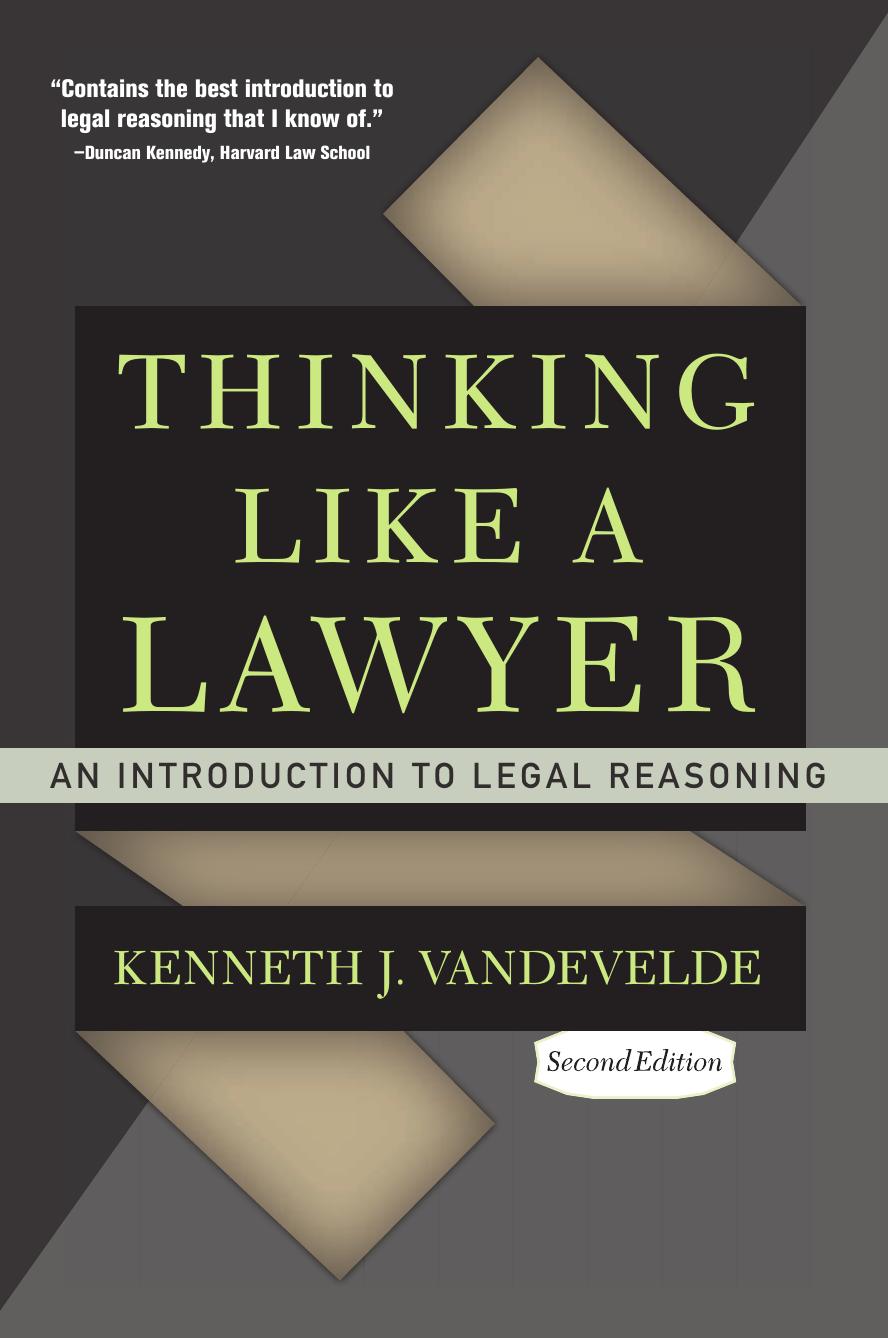Thinking Like a Lawyer: An Introduction to Legal Reasoning by Kenneth J. Vandevelde

Author:Kenneth J. Vandevelde
Language: eng
Format: mobi, pdf
Publisher: Westview Press
Published: 2010-12-27T21:00:00+00:00
Universal Particular
Politics Community Individual
(Majoritarianism) (Individualism)
(Paternalism) (Autonomy)
(Efficiency) (Justice)
(Utilitarianism) (Rights Theory)
Metaphysics Realism Nominalism
(Natural Law) (Positivism)
Epistemology Rationalism Empiricism
(Formalism) (Instrumentalism)
—Rules —Standards
—Objectivism —Subjectivism
Judicial opinions often do not even seek to be consistent in theory at high levels of generality. For example, instrumentalism and utilitarianism are often associated with each other, as are formalism and positivism as well as natural law and individual rights, despite the fact that each of these pairings draws from opposite columns in the diagram.
Inconsistencies in theory at high levels of generality are of little, if any, concern to a court. Indeed, to go one step further, it is virtually inevitable that a judicial decision will be inconsistent in theory at some level of generality. Or to restate the assertion, judicial decisions cannot make every policy choice in favor of the same pole of the dualism of the universal and the particular.
The inability to rest consistently on the same pole of the dualism of the universal and the particular reflects a paradox underlying Enlightenment liberalism. The paradox is that either pole of these three dualisms, if pursued to its logical conclusion, is ultimately destructive of itself.
In politics, individual freedom, if taken to its extreme, leads to anarchy and the tyranny of the strong over the weak. Individual freedom can be guaranteed only by the power of the state. State power, by contrast, if taken to its extreme, leads to a completely totalitarian society in which individuals have no liberty or value and thus no stake in preserving the state.
In metaphysics, to be an extreme realist and claim that every rule is eternally fixed and absolute eliminates the possibility of change or of resolving conflicts between apparently conflicting absolutes. To be an extreme nominalist, however, and claim that every rule is contingent and constantly mutable reduces law to a set of arbitrary ad hoc decisions. In either case, law loses the capacity to function as law.
In epistemology, to be an extreme formalist and state rules at the highest possible level of generality renders the rules incapable of determining any situation and thus ineffective. To state every rule at the lowest level of generality, however, would preclude any rule from governing more than the precise situation for which it was formulated and similarly render it incapable of determining any future situation.
This paradox has been reflected in each of the policy conflicts described above, under the heading “Specific Policy Conflicts.” Tensions between rights theory and utilitarianism, for example, or between naturalism and positivism or formalism and instrumentalism were described as incapable of full and final resolution. Courts choose rights theory one day and utilitarianism the next. They decide one case on purely formal grounds without any reference to policy and decide the next case entirely on grounds of policy.
This paradox restated is simply that to adhere to policies or ends that are completely consistent as a matter of theory produces consequences that are contrary to those same ends. Total freedom leads to anarchy and domination. Complete control leads to collapse. Extreme formalism as well as extreme instrumentalism yields complete indeterminacy.
Download
Thinking Like a Lawyer: An Introduction to Legal Reasoning by Kenneth J. Vandevelde.pdf
This site does not store any files on its server. We only index and link to content provided by other sites. Please contact the content providers to delete copyright contents if any and email us, we'll remove relevant links or contents immediately.
| Annotations & Citations | Law School Guides |
| Legal Profession | Legal Writing |
| Test Preparation |
Master of the Game by Sidney Sheldon(2286)
GRE Premier 2017 with 6 Practice Tests by Kaplan(1854)
Law School Essays that Made a Difference by Princeton Review(1800)
Objection! by Nancy Grace(1778)
Law: A Very Short Introduction by Raymond Wacks(1738)
A Life of Crime by Harry Ognall(1728)
Philosophy of law a very short introduction by Raymond Wacks(1666)
Examples & Explanations: Administrative Law by William F. Funk & Richard H. Seamon(1642)
College Essays that Made a Difference by Princeton Review(1633)
Writing to Win: The Legal Writer by Steven D. Stark(1588)
Cracking the SAT Premium Edition with 6 Practice Tests, 2017 by Princeton Review(1586)
Civil Procedure (Aspen Casebooks) by Stephen C. Yeazell(1554)
GMAT For Dummies by Lisa Zimmer Hatch & Scott A. Hatch(1536)
Sidney Sheldon (1982) Master Of The Game by Sidney Sheldon(1512)
Drafting Contracts: How and Why Lawyers Do What They Do, Second Edition by Stark Tina L(1496)
Storytelling for Lawyers by Meyer Philip(1460)
So You Want to be a Lawyer by Lisa Fairchild Jones Esq(1404)
Graduate Admissions Essays, Fourth Edition: Write Your Way into the Graduate School of Your Choice by Donald Asher(1369)
Introduction to the study and practice of law in a nutshell by Kenney F. Hegland(1328)
